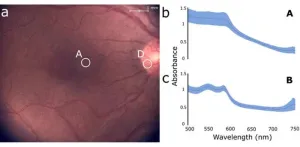(Press-News.org) In a new study, researchers at the University of Chicago were able to predict postoperative infections in liver transplant patients by analyzing molecules in their poop. Their analysis represents a key leap forward in exploring the connection between the gut microbiome — the bacteria that inhabit the human body — and overall health.
“Antibiotic resistance is growing every year and getting worse. Without antibiotics that work, we can't do things like perform surgeries, protect premature infants or treat cancer,” said Christopher Lehmann, MD, an assistant professor of medicine at UChicago Medicine and lead author on the study. “It turns out the human microbiome, particularly the gut microbiome, has adapted to fight off drug-resistant bacteria over the course of history. We need to try to understand how that works to fight off these drug-resistant infections.”
Liver transplant patients are especially susceptible to drug-resistant infections, so Lehmann and his fellow researchers analyzed fecal samples from over 100 liver transplant patients to see if the microbiome could be influencing their risk of infection.
Healthy versus unhealthy microbiomes
The researchers discovered a wide range of microbiome compositions in different patients.
“A healthy microbiome would be composed of over a trillion bacterial cells, with thousands of unique species — like a diverse rainforest,” explained Lehmann. “Some patients have that entire ecosystem wiped out. They still have over a trillion cells, but there’s only one single bacterial species — usually a bad, drug-resistant one. It would be like clear-cutting the rainforest and planting nothing but a single harmful weed species.”
The researchers found that healthy microbiomes produce several key metabolites, which are molecules made through digestion or other chemical processes inside an organism. These metabolites include short-chain fatty acids, which are beneficial to human hosts, as well as secondary bile acids produced when the bacteria modify human bile acids to fit their own needs.
It turned out that in a diverse microbiome, those needs include fighting off drug-resistant bacteria. Some of the bile acids are highly toxic to bacteria such as vancomycin-resistant Enterococcus (VRE), a type of antibiotic-resistant bacteria that frequently causes infections in patients who’ve undergone surgery, cancer treatment or intensive care.
The predictive power of poop
Next, the researchers examined their data to see if there was a correlation between microbiome composition and postoperative infections.
“It turned out that the amount of drug-resistant pathogens in the microbiome predicted postoperative infections with an accuracy we’d normally be looking for in a clinical test,” Lehmann said.
The team then took it one step further. Rather than sequencing genomes to identify specific bacterial species, they decided to look just at the metabolites in patients’ poop to see if those molecules offered the same predictive value. The metabolites alone allowed them to sort patients into two categories: healthy microbiomes and unhealthy microbiomes. Making the final analytical leap, the scientists found they could use the metabolites to predict whether a patient would get an infection at all.
“We can go straight from metabolites to predicting a clinical outcome,” Lehmann said. “This is important because metabolomic analysis can be performed very quickly, whereas sequencing is relatively slow.”
The analytical algorithm is currently very complicated and would need extensive validation before being used as a diagnostic or predictive test in clinical practice. However, these findings lay the groundwork for future studies that could solidify the connection between infection and metabolites in poop, as well as exploring potential causal relationships.
The next step: fixing microbiomes to prevent infection
“The next step of this course of research will be investigating whether we can use these findings to correct people’s microbiomes,” Lehmann said. Patients who have unhealthy, single-species gut microbiomes and are at high risk of infection could potentially receive healthy gut bacteria from external sources restore production of healthy metabolites, including molecules like the secondary bile acids that can help protect against drug-resistant infections.
In 2023, FDA approved two microbiome restoration products. “Microbiome restoration isn’t in the far-off future; it’s already in the present,” Lehmann said.
UChicago’s Biological Sciences Division already has a biobank containing thousands of bacteria, all of which have been analyzed and categorized based on their genomes and what metabolites they produce. UChicago is building a Good Manufacturing Practices (GMP)-compliant facility that will allow scientists to produce, filter, and freeze-dry key gut bacteria derived from healthy donors and pack them into pharmaceutical-grade capsules that people can take like pills.
“We’ve already made a handful of cocktails of bacteria that are missing from patients who have bad outcomes but present in patients that have good outcomes,” Lehmann said. “Those bacteria can work together to make the metabolites that were missing in patients that got infections, and then they can inhabit the gut and theoretically defend against future negative outcomes.”
In patients who have received broad-spectrum antibiotic treatment, such capsules could be used to repopulate healthy gut bacteria that were wiped out. In patients who are at high risk for drug-resistant bacterial infections, supplementing their microbiome metabolites may be able to provide some protection.
“We’ve been losing the battle against multiple drug-resistant bacteria, so we desperately need more weapons,” Lehmann said. “Understanding the microbiome, testing the microbiome’s health, and restoring the microbiome are all crucial new tools we can add to our arsenal.”
The study, “Fecal metabolite profiling identifies liver transplant recipients at risk for postoperative infection,” was published in Cell Host & Microbe in December 2023. Funding and metagenomic and metabolomics platforms were provided by the University of Chicago Duchossois Family Institute. Co-authors include Nicholas P. Dylla, Matthew Odenwald, Ravi Nayak, Maryam Khalid, Jaye Boissiere, Jackelyn Cantoral, Emerald Adler, Matthew R. Stutz, Mark Dela Cruz, Angelica Moran, Huaiying Lin, Anitha Sundararajan, Ashley M. Sidebottom, Jessica Cleary, Eric G. Pamer, Andrew Aronsohn, John Fung, Talia B. Baker and Aalok Kacha.
END
Microbiome insights found in poop help predict infections in liver transplant patients
2023-12-15
ELSE PRESS RELEASES FROM THIS DATE:
A new tool to better model future wildfire impacts in the United States
2023-12-15
SAN FRANCISCO – Wildfire management systems outfitted with remote sensing technology could improve first responders’ ability to predict and respond to the spread of deadly forest fires.
To do this, researchers at The Ohio State University are testing the use of Synthetic Aperture Radar, or SAR, to help with wildfire detection.
For many ecosystems, fires are vital tools that help to clear away plant waste, provide safer habitats for smaller species and burn off disease. Yet as Earth continues to experience warmer, drier conditions, the likelihood and severity of large, uncontrolled fire incidents that result in widespread ...
Navigating climate challenges: UVA engineers and environmental scientists aid Virginia’s eastern shore
2023-12-15
Because of warming waters and melting glaciers, the sea level at Virginia’s Eastern Shore has risen almost 3 inches since 2016, and the projected trajectory looks ominous. The region, sandwiched between the Chesapeake Bay and the Atlantic Ocean, has one of the highest rates of relative sea-level rise on the Atlantic coast. The Virginia Institute of Marine Science’s Center for Coastal Resource Management projects a relative sea-level rise between 4.5 to 7 feet by 2100, which is three to four times the global average.
Hampton, Virginia — its neighbor across the bay — ranks second only to New Orleans as the largest population center ...
Using AI to pinpoint hidden sources of clean energy underground
2023-12-15
SAN FRANCISCO – As efforts to transition away from fossil fuels strengthen the hunt for new sources of low-carbon energy, scientists have developed a deep learning model to scan the Earth for surface expressions of subsurface reservoirs of naturally occurring free hydrogen.
Researchers used the algorithm to help narrow down the potential whereabouts of ovoids or semicircular depressions (SCDs) in the ground that form near areas associated with natural or “gold hydrogen” deposits. Though these circular ...
A study from IMDEA Software researchers reveals hidden fortunes and surprising overestimations in cybercrime revenue
2023-12-15
To what extent methodological limitations and incomplete data impact the revenue estimations of cybercriminal groups using the Bitcoin blockchain was largely unknown. A new study, conducted by IMDEA Software Institute researchers Gibran Gomez, Kevin van Liebergen, and Juan Caballero challenges existing figures regarding cybercriminals' Bitcoin earnings to date. The study, entitled "Cybercrime Bitcoin Revenue Estimations: Quantifying the Impact of Methodology and Coverage", recently presented at the ...
Department of Defense grant boosts study of pressure, humidity on thermal energy storage
2023-12-15
Under the Defense University Research Instrumentation Program, Dr. Patrick Shamberger and a research team from the Department of Materials Science and Engineering received a grant from the U.S. Department of Defense (DOD) to acquire instrumentation for thermal energy storage research.
The grant, administered through the Office of Naval Research, will support the acquisition of a high-sensitivity multi-modal calorimeter for advanced research and education on tunable energy storage materials. This equipment will allow cutting-edge research to study the capability of pressure and humidity to control how well these materials can store ...
IU researchers fill the final gaps in the Arabidopsis genome sequence and gain insights into gene regulatory mechanisms relevant to humans
2023-12-15
Arabidopsis thaliana is a species grown worldwide for genetic research and was the first plant to have its complete set of chromosomes (its genome) sequenced. The initial genome sequence, released in the year 2000, had numerous gaps, but technological improvements in the years since closed the gaps, one by one, until only two remained: large undefined regions on chromosomes 2 and 4 where genes encoding ribosomal RNAs are repeated in hundreds of copies. These ribosomal RNA gene clusters, known as nucleolus organizer regions (NORs), are not just difficult to define in Arabidopsis; gaps remain at ...
Toward more precise and flexible targeted spectroscopy measurements in the retina
2023-12-15
Many ocular diseases involve changes in the structure and function of different regions of the back of the eye, also known as the “eye fundus.” For example, fluorescent pigments and tiny yellowish deposits called drusen accumulate under the retina in age-related macular degeneration, and the degeneration of neurons called ganglion cells is a defining characteristic of glaucoma. Interestingly, changes in the eye fundus are not restricted to vision-related diseases only. Certain neurological diseases like Parkinson’s and Alzheimer’s can cause changes in retinal nerves and ...
UVA biomedical engineer unveils the dynamics of maternal immune responses
2023-12-15
Sepideh Dolatshahi, an assistant professor of biomedical engineering at the University of Virginia, is spearheading an exploration of systems immunology in its crucial development phase — during pregnancy.
Systems immunology is about unraveling concealed patterns within the human immune system, said Dolatshahi, whose approaches to her research span computational modeling, systems serology and cutting-edge spatial analysis techniques to investigate immune interactions between mother and fetus during pregnancy that could later support early childhood immunity.
Designing Tailored and Effective Vaccine Plans
Babies are immunocompromised ...
Novel therapeutic target overcomes resistance to radiation therapy
2023-12-15
A new study finds that radiation therapy (RT) suppresses a key protein called bone morphogenetic protein and activin membrane-bound inhibitor (BAMBI) and activates immune suppressive cells. These effects dampen the capacity of cancer-fighting immune cells and decrease the effectiveness of radiation, inducing therapy resistance in cancer patients, according to a paper published December 15, 2023 in the Journal of Clinical Investigation.
Radiation therapy is a common cancer treatment that kills cancer cells and activates immune cells to fight cancer. Yet this process also ...
Understanding atmospheric flash droughts in the Caribbean
2023-12-15
The word “drought” typically conjures images of parched soil, dust-swept prairies, depleted reservoirs, and dry creek beds, all the result of weeks or seasons of persistently dry atmospheric conditions.
In the sun-soaked islands in the Caribbean, however, drought conditions can occur much more rapidly, with warning signs appearing too late for mediation strategies to limit agriculture losses or prevent stresses on infrastructure systems that provide clean water to communities.
Such occurrences – known as flash droughts – are the focus of a new paper authored by Assistant Professor Craig Ramseyer of the College of Natural Resources ...





